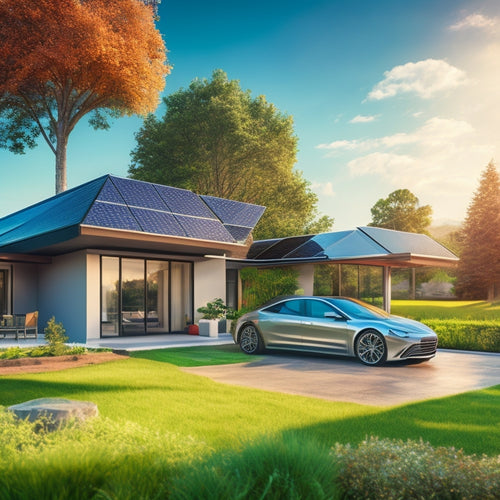
What Is the Cost of Solar Panels for Your House
Share
You're likely to pay between $15,000 and $30,000 for a typical residential solar panel system, depending on the system size, equipment quality, and installation company. Labor costs vary based on location and installer experience, while equipment costs fluctuate based on the quality and brand of solar panels and inverters. Although the upfront investment seems substantial, significant portions of it can be recouped through solar savings over time. As you investigate the possibilities of solar energy for your home, you'll want to contemplate the factors that influence costs, incentives, and long-term benefits to make an informed decision.
Key Takeaways
- The typical cost of a residential solar panel system ranges from $15,000 to $30,000, depending on system size and equipment quality.
- Labor costs vary based on location and installer experience, while equipment costs fluctuate based on the quality and brand of solar panels and inverters.
- The cost of solar panels can be reduced through financing options, such as loans and power purchase agreements, and installers may offer rebates to reduce upfront costs.
- The cost of solar panels is influenced by factors such as system size, location, climate conditions, and regional energy policies, which affect overall installation costs.
- Despite the initial investment, solar panels can provide long-term benefits, including average annual savings of $400 to $1,000 on electricity bills.
Average Cost of Solar Panels
Across the United States, the average cost of solar panels for a typical residential solar panel system ranges from $15,000 to $30,000, depending on the system size, quality of equipment, and installation company.
You're likely interested in understanding the cost of solar panels for your house, and this range gives you a general idea of what to expect. However, it's crucial to take into account that you'll likely recoup a significant portion of this investment through solar savings. Over time, you'll generate free electricity, reducing your reliance on the grid and lowering your utility bills.
To make solar energy more accessible, financing options are available. You can investigate various financing models, such as loans or power purchase agreements, to reduce the upfront cost.
Some installers and manufacturers also offer financing options or rebates, which can help you get started with solar energy. By understanding the average cost of solar panels and investigating financing options, you can make an informed decision about investing in a solar panel system for your house.
With the right financing and a clear understanding of the costs, you can start enjoying the benefits of solar energy and the savings that come with it.
Factors Affecting Solar Panel Cost
You'll find that the cost of solar panels for your house is influenced by several key factors.
The size of the system you need, which is determined by your energy requirements, is a significant cost driver.
Additionally, your location and climate will also impact the cost, as systems in areas with more sunlight or extreme weather conditions may require specialized equipment or installation.
System Size Matters
The solar panel system size, measured in watts (W), greatly impacts the overall cost of your solar panel installation. The larger the system capacity, the more energy it can generate, but it also increases the cost. You'll need to determine how much energy you want to produce and how much space you have available for the panels.
| System Size (W) | Average Cost Range |
|---|---|
| 2,000 - 4,000 W | $6,000 - $12,000 |
| 4,000 - 6,000 W | $12,000 - $18,000 |
| 6,000 - 8,000 W | $18,000 - $24,000 |
| 8,000 - 10,000 W | $24,000 - $30,000 |
When choosing a system size, consider your energy efficiency goals and the amount of space available on your roof. A larger system may not always be the best option, as it may not be necessary to meet your energy needs. A smaller system, on the other hand, may not be enough to power your home efficiently. You'll need to find the right balance between system capacity and cost to ascertain you're getting the most out of your solar panel installation.
Location and Climate
As you weigh the cost of solar panels for your house, it's vital to evaluate how your location and climate factor into the equation. Your location's solar irradiance, or the amount of sunlight it receives, greatly impacts solar panel efficiency. Areas with high solar irradiance, like the Southwest, can generate more power per hour than regions with lower irradiance, like the Northeast. This means you may need a smaller system in sunnier locations, reducing overall costs.
Climate also plays a role, as extreme temperatures can affect system performance. For example, high temperatures can decrease efficiency, while cold temperatures can increase it. Your installer will consider these factors when designing your system to guarantee peak performance.
Regional energy policies also vary by location, influencing the cost of solar panels. Some states offer incentives, like tax credits or rebates, to encourage solar adoption, while others have policies that increase the cost of connecting to the grid.
Understanding these policies and how they impact your system's cost is vital to making an informed decision. By considering your location and climate, you can enhance your solar panel system's performance and reduce costs.
Cost of Installation and Maintenance
How much will it set you back to get solar panels up and running on your roof? The installation process involves several costs, including labor, equipment, and permits.
On average, the total installation cost ranges from $15,000 to $30,000, depending on the size of your system and the complexity of the installation.
Here are three key factors that affect the cost of installation and maintenance:
-
Labor costs: The cost of hiring a professional installation team can vary depending on the location and the installer's experience.
-
Equipment costs: The cost of the solar panels, inverters, and mounting hardware can fluctuate based on the quality and brand of the equipment.
-
Permitting and inspection fees: You'll need to pay for permits and inspections to guarantee your system meets local building codes and safety standards.
To minimize maintenance costs, follow these tips:
- Regularly inspect your system for damage or debris
- Clean your panels periodically to guarantee peak energy production
- Monitor your system's performance to identify any potential issues
Types of Solar Panels and Prices
When you're considering solar panels for your house, you'll encounter two main types: monocrystalline and thin-film.
You'll want to understand their differences, as they impact the overall cost of your solar panel system.
Monocrystalline Solar Panels
What drives the efficiency of solar panels, and why do monocrystalline solar panels stand out from the rest? The answer lies in their unique structure.
Monocrystalline solar panels are made from a single crystal of silicon, which allows them to achieve higher efficiency ratings compared to other types of solar panels.
Here are three key benefits of monocrystalline solar panels:
-
Higher Efficiency Ratings: Monocrystalline solar panels have efficiency ratings ranging from 15% to 20%, making them more effective at converting sunlight into electricity.
-
Longer Warranty Options: Monocrystalline solar panels typically come with longer warranty options, often up to 25 years or more, giving you peace of mind and protection for your investment.
-
Better Heat Tolerance: Monocrystalline solar panels perform better in high-temperature environments, ensuring that your system continues to generate power even on hot summer days.
Thin-Film Solar Panels
As you investigate the various types of solar panels for your house, it's worth considering thin-film solar panels, which offer a distinct set of advantages and trade-offs compared to monocrystalline solar panels.
Thin-film solar panels use a thin layer of photovoltaic material to convert sunlight into electricity, making them lighter and more flexible than traditional solar panels. This thin film technology also reduces material costs, making them a more affordable option.
However, thin-film solar panels have lower efficiency rates compared to monocrystalline solar panels. They typically range from 7-14% efficiency, whereas monocrystalline solar panels can reach up to 20% efficiency. This means you'll need more thin-film panels to generate the same amount of power as a smaller number of monocrystalline panels.
In terms of pricing, thin-film solar panels are generally cheaper than monocrystalline solar panels, with prices ranging from $2.50 to $3.50 per watt.
While they may not be as efficient, thin-film solar panels can still provide a reliable source of renewable energy for your home.
Incentives and Rebate Programs
Several lucrative incentives and rebate programs can considerably offset the upfront cost of solar panels for your house. As you consider investing in solar energy, you'll want to take advantage of these opportunities to minimize your expenses.
-
Federal Incentives: The Solar Investment Tax Credit (ITC) is a federal incentive that allows you to claim a tax credit of 26% of the total cost of your solar panel system. This can considerably reduce your tax liability and help you recoup some of the upfront costs.
-
State Rebates: Many states offer rebates or cash incentives for homeowners who install solar panels. These programs vary by state, but they can provide additional savings on top of the federal incentive.
-
Utility-Specific Incentives: Some utility companies offer special rates or discounts for customers who generate their own renewable energy. Be sure to check with your utility provider to see if they offer any incentives for solar panel owners.
Is Solar Energy Worth the Cost
Your solar panel system's sticker price might raise eyebrows, but it's essential to weigh this initial outlay against the long-term benefits and savings.
You'll want to take into account the solar savings you'll accumulate over time, which can greatly offset the upfront cost. In fact, according to the US Department of Energy, a typical residential solar panel system can save homeowners between $400 and $1,000 per year on their electricity bills.
Moreover, solar energy provides you with energy independence, reducing your reliance on the grid and shielding you from rising electricity rates. By utilizing the power of the sun, you'll be generating your own clean energy, free from the whims of utility companies.
This independence can be particularly important for those living in areas with high energy costs or frequent power outages.
When evaluating the cost of solar panels, remember to factor in the long-term benefits, including increased property value, reduced carbon emissions, and a potential enhancement in your home's resale value.
With solar energy, you're not just investing in a system – you're investing in a sustainable future.
Frequently Asked Questions
Can I Install Solar Panels on a Rented Property?
You're wondering if you can install solar panels on a rented property. As a renter, you'll need to contemplate renter considerations, such as obtaining landlord approval and exploring a solar lease, which allows you to benefit from solar energy without owning the system.
Do Solar Panels Work During Power Outages?
You're left in the dark, wondering if your solar panels will kick in during a power outage. Unfortunately, they won't, unless you have an outage backup system, which guarantees continuous solar panel performance even when the grid fails.
How Long Does It Take to Install Solar Panels?
You'll typically spend 1-3 days on installation, but the timeline varies depending on installation factors like roof complexity, system size, and local permits, so be prepared to plan accordingly to get your solar panels up and running efficiently.
Can I Add More Panels to My Existing System?
You can expand your existing system by adding more panels, but you'll need to guarantee panel compatibility and assess your current system's capacity for system expansion, considering factors like inverter size and electrical infrastructure.
Will Solar Panels Increase My Property Taxes?
You'll likely experience a property value enhancement with solar panels, but don't worry, you won't be taxed on the added value in most states; instead, you'll enjoy solar tax incentives, offsetting any potential increase in property taxes.
Related Posts
-

What Solar Panels Work Best With EVS Online?
When shopping for solar panels online to power your electric vehicle, look for high-efficiency models that can withst...
-

Charging Points in Rural Areas: 5 Key Insights
When driving through rural areas, you'll face a shortage of charging points, making EV ownership stressful and inconv...
-

Step-by-Step Guide to Converting Your Vehicle to EV
You'll begin by evaluating your vehicle's conversion potential, analyzing its weight, aerodynamics, and powertrain co...


